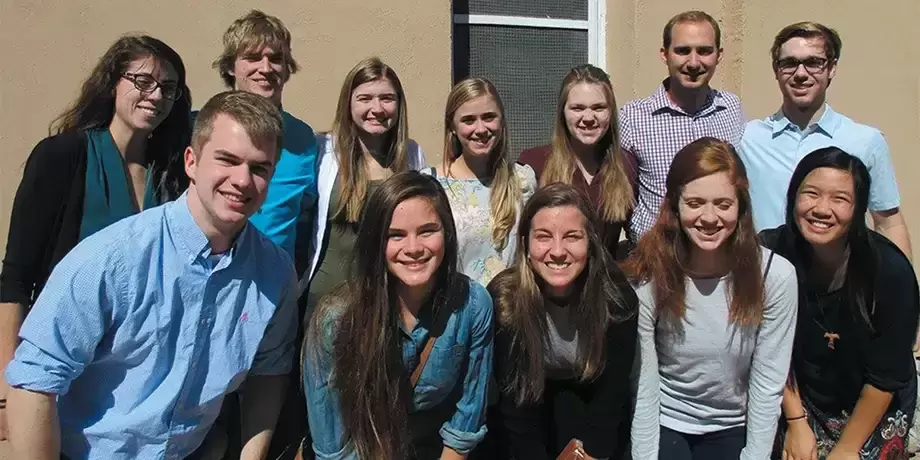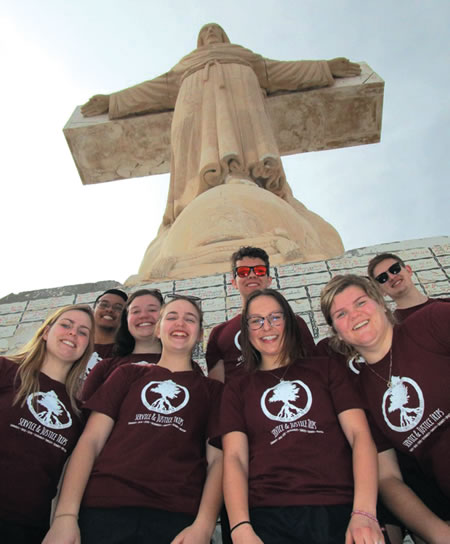
As I sat in my office at the Columban Mission Center in El Paso, Texas, I felt that something was missing. It had been a busy morning so far, on that hot day. We still had about half of the 30 migrant families that immigration authorities had brought for us to shelter. Some of our guests might stay with us for up to three or four days, as they waited for the volunteer drivers from the area to take them to the airport or one of the bus stations in town.

A group of teenagers among them were chatting together on the front steps. The mothers had gathered to share their stories in the large dining room, and one seven-year-old child was by himself, in the lecture hall next to the dining room, not far from his mother—and bored.
I was catching up on correspondence that morning, and had a pile of deskwork ahead, but I thought about this smart little boy, all by himself, from Honduras, who had been helping with housecleaning and pulling up weeds outside to the best of his ability. It was too hot to work outdoors now, though, in the great Chihuahuan desert that El Paso, Texas, Juarez, Mexico, and other towns of this region were located in. I decided to help him pass the time, since no one else his age was around to play with him.
So we invented a game, with some of the toys and items at hand in the lecture hall. I found two “Hot Wheels” tiny cars, and we built a ramp from a narrow board, putting one end on top of a half-dozen hardcover books, on top of a folding table that was about six feet long. Then we placed seven dominoes at different points at the other end of the table, standing them up, and I got a paper and pencil.
Taking turns letting each of our two cars run straight down the ramp and hitting one of the dominoes, we kept score according to the dots on each fallen domino, until the first one to score more than 50 points won!
It was a silly game, we both knew, but we got into it, and the boy was very happy. His mother confided to me afterwards that it meant a lot to him, to be paid attention to like that. Curiously, it also did something for me, after about an hour of play had passed and I returned to my deskwork. I began to reflect on how we, as adults who took many things so seriously, needed to get in touch with the value of play for a sense of balance into our lives. Not for the first time, I felt thankful for one of many lessons I learned from migrating people.
Many universities in the U.S. would send us groups each year, of about a dozen students each, to spend a week or more under our guidance to the Borderlands—as locals call their binational area of business, educational, commercial and social life—to spend a week under our guidance, when we weren’t hosting migrant families. They would hear, see and reflect upon their experiences of the U.S.-Mexico border, formed by the Rio Grande River.
One of the most gratifying effects of this Border Awareness Program offered by the Columban Mission Center was when I followed up with such groups afterwards, and found out about the important decisions the participants made once they returned to New York, Chicago, Omaha, or wherever. Immigration lawyers, government leaders, social workers and, yes, even cross-cultural missionaries like us emerged as the new career choices of some of the participants. I saw the same thing happen in many young people while I lived and worked in Chile, during the dictatorship, too, years before, and marveled once again at how such activities of solidarity and accompaniment of vulnerable populations altered their life decisions.
They obviously felt a tug on their hearts while with us, listening to accounts of the travails of migrating people, shared with tears on the faces of both speakers and listeners, with me translating from Spanish into English, and English to Spanish. The impact of witnessing the suffering of people as well as the moral clarity and commitment of people motivated by faith, or by their ideals, to welcome and accompany them led our young visitors to walk along new paths in their lives later on.
A few years after leaving El Paso, the Columbans assigned me to Saint Columban’s Residence in Bristol, Rhode Island, where I live now with our older and retired priests, and I saw an opportunity to offer Sunday Mass to some twenty students, on average, at Roger Williams University, right across the street. The Catholic campus ministry at the school had organized a weekly Mass for many years, but found it difficult to get a priest on a regular, constant basis at that time, so I offered to take on the service.
It’s humbling for me to see how, once again, accompanying young adults enriches my life with their example of devotion during the Mass, and willingness to live their faith in their lives and in preparations for their careers. Some of the students find time in their busy schedules to help out at a nearby parish, moving donated furniture from a storage building there to the homes of refugee families from Asia, Africa, Latin America and the Ukraine, all sponsored by the Catholic Diocese of Providence. We had a towel-donation drive on campus before Christmas break last year for the refugees, and gathered over 50 towels.
Children and young adults have interrupted and run laughing through my life’s plans, projects and schedules, much to my wonder and delight, no matter where Christ’s mission brought me to over the years, and they still do. I thank God for the grace of these breaks in my routines, and for the part of me that gets invited to come out and get some exercise, in games and fun! The deep wisdom of Jesus’ teaching gets clearer and moves my heart more deeply as time goes on, “Truly I tell you, unless you change and become like children, you will never enter the kingdom of heaven.” (Matthew 18:3)
Columban Fr. Robert Mosher lives and works in Rhode Island.